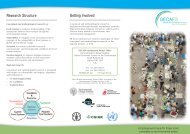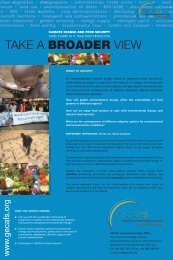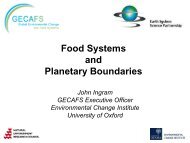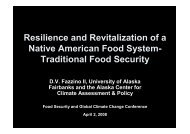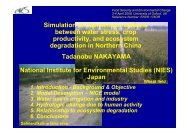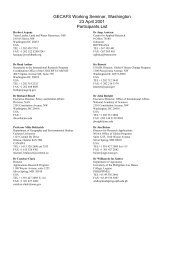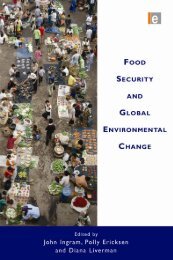From Food Production to Food Security - Global Environmental ...
From Food Production to Food Security - Global Environmental ...
From Food Production to Food Security - Global Environmental ...
- No tags were found...
You also want an ePaper? Increase the reach of your titles
YUMPU automatically turns print PDFs into web optimized ePapers that Google loves.
Agronomic science is central <strong>to</strong> improving input-use efficiency in Type II and searching forviable options for Type III. This is especially important given the feedbacks <strong>to</strong> climate forcingdiscussed above, and is therefore high on the policy agenda. While increasing production inthe future may further increase emissions if no changes in practice are wrought, alternativemanagement strategies could effectively reduce emissions (Gregory et al., 2005). For example,surface seeding and/or zero-tillage, and the establishment of upland crops after rice gives similaryields <strong>to</strong> crops planted under normal conventional tillage over a diverse set of soil conditions,but reduces costs of production and allows earlier planting which offers higher yields. Thepractice also increases the efficiency of water and fertilizer use. It is worth noting, however, thatwhile such increases will help meet demand, the yields required using current technologies areanticipated <strong>to</strong> fall short of those needed by 2020, let alone 2050 (Bruinsma, 2003).Depending upon the international policy environment and opportunities (e.g. carbonmarkets, or payments for ecosystem services) extensification and intensification may takeplace with very different agricultural practices than those that dominate the landscape intropical and subtropical countries <strong>to</strong>day. This offers the potential for opportunities <strong>to</strong>overcome concerns about biogeophysical (e.g. changing albedo though changes in vegetationcover and dust) and biogeochemical (e.g. increasing greenhouse gas emissions) feedbacks <strong>to</strong>the climate system through climate forcing associated with current extensification andintensification (Gregory et al., 2002).Agronomic research in relation <strong>to</strong> regional food productionAs pointed out above, the major emphasis of climate change/food security research overrecent years has been concerned with the impacts of climate change on crop yield. Further, suchstudies have often sought <strong>to</strong> limit yield-reducing fac<strong>to</strong>rs related <strong>to</strong> pests, weeds and pollution(unless such fac<strong>to</strong>rs were the subject of enquiry). While several key research issues remain(Figure 4, left-hand column), agronomic research has thus far provided an excellentfoundation for assessments of how climate change may affect crop productivity. Theconnectivity between these results and the broader issues of food production at large scalesare, however, relatively poorly explored.Agronomic research has traditionally been conducted at plot scale over a growing season orperhaps a few years, but many of the issues related <strong>to</strong> regional production operate at largerspatial and temporal scales. Aware of the need for better links between agronomic researchon crop productivity at plot scale and regional production, especially over time, the last decadeor so has seen agronomists beginning <strong>to</strong> establish trials at landscape scale. There are, however,several considerable methodological challenges <strong>to</strong> be overcome at such scales (Figure 4,middle column). The first is <strong>to</strong> work more effectively with economists and other socialscientists, as well as with system ecologists, <strong>to</strong> capture the key biophysical, social, economicand ecological processes at play at different spatial scales. This includes analysing interactionsamong variables from one scale <strong>to</strong> the other. For instance, a decrease in maize yield at the plot30



